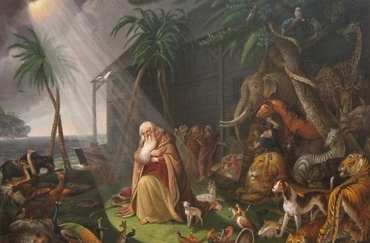Arcana Coelestia # 435
435. As regards 'the man and his wife' here being used to mean the new Church which earlier on was meant by 'Adah and Zillah', this nobody can know or deduce from the sense of the letter, for previously 'the man (homo) and his wife' meant the Most Ancient Church and its descendants. The point is clear however from the internal sense, and also from the fact that a little further on, in verses 3-4 of the next chapter, reference is again made, though the wording is entirely different, to the man and his wife begetting Seth. At that point the first generation of the descendants of the Most Ancient Church is meant. Unless something different were meant at this point there would be no need to say the same thing again. A parallel to this exists in Chapter 1, where the subject is the creation of man, and also of the fruits of the earth, and of beasts; followed by Chapter 2, where similar events are described, the reason for the similarity being, as has been stated, that Chapter 1 deals with the creation of the spiritual man, Chapter 2 with the creation of the celestial man. When this kind of repetition of one and the same person or thing occurs, something different is meant on the first occasion from the second. But the exact meaning cannot possibly be known except from the internal sense. The actual train of thought in like manner establishes the meaning here. And there is the added consideration that 'man and wife' is a general expression meaning that Church, which is the subject here and from which the new Church was born.
Beast

In Genesis 1:24, beasts signify the things of man's will or loves. (Arcana Coelestia 44, 46)
In Genesis 9:10, beasts signify all that was living in the man of the Ancient Church, and also what belonged to his new will; likewise the lower things of his understanding and the will therefrom. (Arcana Coelestia 1026-1029)
In Psalm 104:20, beasts signify affections longing to be instructed, or spiritually nourished. (Apocalypse Explained 650[10])
In Luke 10:35, since the beast was a donkey, this signifies to instruct another according to his capability. (Apocalypse Explained 1154)
The beast of the south (Isaiah 30:6) signifies people who are principled in the knowledges of good and of truth, but do not apply them to life and instead to science.
Every beast and creeping thing (Genesis 8:19) signifies the goodnesses of the internal and external man.
"Beasts" represent the affection for doing good things, a true desire to do them from the heart. In the negative sense, "beasts" stand for the lust to do evil.
The beast ascending out of the sea (Revelation 13:1) signifies reasonings from the natural man confirming the separation of faith from life.
(Odkazy: Apocalypse Explained 13, 773; Revelation 13:11)






